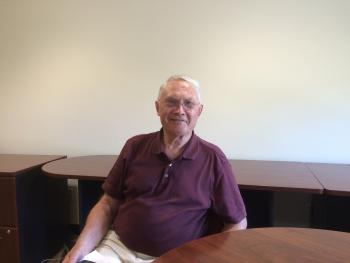Emory Anderson

Voices from the Science Centers
Voices from the Science Centers is an oral history initiative dedicated to documenting the institutional knowledge of fisheries scientists and administrators in the labs of NOAA’s Fisheries Science Centers.
Dr. Emory Anderson was born on September 11, 1939, in Kenmare, North Dakota. He attended Dana College, majoring in Mathematics and minoring in Physics. After graduating, he became a high school math teacher. After two years of teaching, Anderson decided he wanted to pursue a career involving wildlife and the outdoors. He attended the University of Minnesota, where he first took preliminary science courses to prepare him for graduate school. During this time, he worked as a fish hatchery technician, encouraging him to pursue fisheries science. Anderson was accepted to graduate school at the University of Minnesota and received his PhD. in Fisheries Biology. He started working at the National Marine Fisheries Service Northeast Fisheries Science Center in Woods Hole, where he worked for 15 years. He later worked with the International Council for the Exploration of the Seas [ICES] as a statistician in charge of fisheries assessment and General Secretary for eight years. Since 2008, he has served as an editor of the ICES Journal of Marine Science and ICES Cooperative Research Report series.
Scope and Content Note
In this interview, Dr. Emory Anderson discusses his education and work experience, particularly his time as General Secretary and statistician for ICES. He begins by describing his early life in the Midwest, his undergraduate education, and his early career. His fond childhood memories of fishing on the Des Moines River and his love of the outdoors inspired him to pursue a career in fisheries science. He describes his experience returning to school for an advanced degree at the University of Minnesota. He recalls his first fisheries job at the Woods Hole Northeast Fisheries Science Center. He describes what the work environment and research focuses were in the 1970s, including early discussions of the 200 mile exclusive economic zone in the US and the process of stock assessments at that time. He also chaired several mackerel and groundfish working groups. Anderson details his career at the ICES headquarters in Copenhagen, Denmark, as a statistician and General Secretary, which lasted eight years and began in 1985. He describes the difference in assessment methods between U.S. and European fishery scientists and the work ICES did with other environmental issues like water quality. He recalls truly enjoying his time at ICES, despite the significant budgetary limitations of the time and shares how he helped to modernize the organization through technology, methodologies, and office furniture. Budget struggles. Anderson continued to attend some of the ICES annual meetings before becoming a journal editor in 2008. He planned to give a seminar at the SMAST [University of Massachusetts Dartmouth School for Marine Science and Technology] seminar series in October 2016.
Subjects: fisheries biology, NOAA, NMFS, Woods Hole, International Commission for the Northwest Atlantic [ICNAF], exclusive economic zone, mesh size, overfishing, statistics, cod, haddock, mackerel, stock assessment, ICES, working groups.
Please Note: The oral histories in this collection are protected by copyright and have been created for educational, research and personal use as described by the Fair Use Doctrine in the U.S. Copyright law. Please reach out Voices@noaa.gov to let us know how these interviews are being used in your research, project, exhibit, etc. The Voices staff can help provide other useful resources related to your inquiry.
The NOAA mission is to understand and predict changes in climate, weather, oceans, and coasts, to share that knowledge and information with others, and to conserve and manage coastal and marine ecosystems and resources. The Voices Oral History Archives offers public access to a wide range of accounts, including historical materials that are products of their particular times, and may contain offensive language or negative stereotypes.
Voices Oral History Archives does not verify the accuracy of materials submitted to us. The opinions expressed in the interviews are those of the interviewee only. The interviews here have been made available to the public only after the interviewer has confirmed that they have obtained consent.
